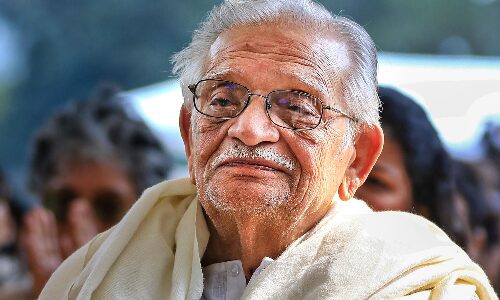Exclusive Premium Content
When Jnanpith Winner Gulzar In A Throwback Interview Spoke About His Love For Urdu

How as a Sikh, do you explain your love for the Urdu language?
Urdu is my favourite language. I know no better means of communication . My writings from the start , even my diary , are written in Urdu. I can also write in Devanagari, Bengali and English, but not as fluently as Urdu. I’m also happy because it’s an award for my written work. You know writing has always been my primary passion. A book has always been more fulfilling than a film. In writing a book, aisa kabhi nahin hota ke koi hasrat baqi reh gayi. Though with a film I can touch crores of hearts at one go, a book has more of me in it than a film. The medium of writing is the most autonomous complete, fulfilling and selfdependent form of creativity. In writing you can never complain about things going wrong. Good or bad, you have to stand by your creativity. Cinema is more collaborative . There’s always the danger of someone spoiling your work, or you spoiling someone’s work. In writing you can give expression to all the thoughts and feelings that cannot be communicated in a mass medium. I’ve been writing more poetry than prose in Urdu. Poetry is a bigger passion for me. I’d rather be recognized as a poet. Maybe someday….
Is writing really more satisfying than cinema?
It’s not a question of more or less satisfying. I’ve always been more passionate about writing. But writing has always been the foundation of all my creative activities. I came to cinema as a writer. Screenplays ,dialogues and filmmaking are all branches of my writing roots. Because of cinema my name as a writer became easily recognizable . This has also been a handicap for me as a writer since literary circles perceive me as a man from cinema and therefore I’ve had difficulty in obtaining the approval of literary masters.
Do you feel you’re able to get a larger readership for your literary works because of your association with cinema?
I’d say so. But it’s hard to tell if people read my books after coming to my films or they see my films after reading my books.
How does one explain your interest in Urdu?
The credit must go to two people—Ahmed Nadeem Qazmi from Pakistan who encouraged me to write , and an Urdu critic Gopi Chand Narang from our own country. Narang Saab was among the first people to comment on my stories. He always encouraged me.
How did you develop an interest in Urdu?
It was the first language that I learnt in school in Punjab. Every male child studied Urdu as the first language, not Punjabi. Even Punjabi was written in the Urdu script and is still written in Urdu in Pakistan. Interestingly the women in Punjab studied Hindi, with the result that husbands and wives couldn’t communicate with each other directly through missives.
Do you think Urdu is dying out?
Certainly not the language. But the script is changing. Like I said, Urdu was the accepted language in Punjab and several Northern states before the Partition. But in last 50 years Punjabi is written in Gurmukhi in India while it continues to be written in Persian in Pakistan. So it’s the script that’s changing. I can say the Urdu script in Punjabi is dying out. Urdu is written in Devanagari in our country. And yet 70 to 80 percent of the language spoken in our films is Urdu . So obviously the language itself isn’t dying. In fact Gandhiji had once suggested we call Urdu Hindustani. I think it was a very wise suggestion. Urdu is the language of Hindustan. So let’s stop pitching Urdu against Hindi.
Do you feel it’s as much the spoken language as Hindi?
I can give you several examples. Shabana Azmi and Naseeruddin Shah can’t write Urdu. But Naseer who’s from Meerut played Mirza Ghalib very effectively in my serial. Both Naseer and Shabana speak Urdu beautifully. In Modern India Devnagri isn’t a vehicle to communicate only Hindi but also a vehicle to communicate Urdu in our country. In course of time the prejudices against Urdu will die out.
And how do you think these prejudices will die down?
Finally the people’s language will prevail. And in India the people’s language is neither the Urdu nor the Hindi that’s being propagated by Pakistan and India. My new collection of stories in Urdu and Hindi is almost ready.
